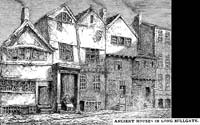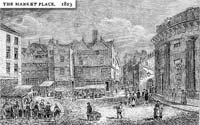
 Long Millgate, Manchester circa 1800 |
'THE PETERLOO MASSACRE'
Monday 16th August, 1819 St. Peter's Field, Manchester. An on-going project towards the 200th Anniversay in 2019 BEFORE ... ON THE DAY ... AFTERMATH |
 Market Place, Manchester in 1823 |
|
MY POLITICAL SINCE 1816Oldham Chronicle February 20th 1885 This formed the title of an interesting lecture last evening, delivered in the Moorside Liberal Club, by Mr James Cooper. Mr T Wolstenholme occupied the chair and there was a fair attendance. The chairman, in introducing Mr Cooper, said that the present were stirring times, but in the time he would speak of there were doubtless equally stirring times. In recalling the period of 1832, though he (as the chairman) did not remember all the details, still the incidents were quite fresh in his mind. Everyman who had reached the age of fifty years must have a history, but to hear a man of 86 was something unusual.. It was wonderful that Mr Cooper could recall the incidents of his political life in times when men stuck to principles. They were very much persecuted, though he had heard a Peterloo veteran, living in Failsworth, say that when the radicals met in those days, they were surrounded and he was 'punced' until his shoes overflowed with blood. Mr Cooper was another veteran, who had agitated in that reform, which began the Charter. Mr Cooper, an old gentleman of 86 years, then delivered his lecture. His remarks were made at considerable length and did infinite credit to his memory. At times, however, he launched into genealogical dissertations, while at others he inveighed against the present actions of the present Opposition, rather than confining his remarks to incidents in bygone years. He said that the cause that he had espoused for 80 years was alive yet and would live as long again, if not for ever. The incidents in his political life had been very curious indeed. He had had a good deal of trouble and anxiety in it, but he had come to reap the fruits from what he had done in his earlier days. He had consented to deliver that lecture to celebrate his 86th birthday (applause). He wished he could live long enough to see, what he wanted doing politically, accomplished. He had fixed the beginning of his experience at 1816, because, in that year, his first serious experiences began. He got very badly used in that year at a radical meeting. It was held at the bottom of Bent, called and legally so, for the purpose of petitioning Parliament for the repeal of the Corn Laws, voting by ballot and the largest part of the Charter. The meeting was called and the authorities being alarmed, about 26 or 30 special constables were sworn in. After Henry Hunt had spoken, he was with John Clegg, son of Abraham Clegg, hat manufacturer, bottom o'th Bent, to the Swann Inn, where the special constables were drinking. As a workman named Radcliffe was arrested by the officers, Clegg remonstrated with them and was set on in return and kicked savagely. As he was nearly strangled in the struggle, the lecturer went to his assistance, but was himself violently assaulted, 'punced' and thrown into the deep mud of the unpaved street. Radcliffe was arrested, but escaped from the lock-up, which was then opposite the Old Church, only to be re-arrested and taken before a magistrate. Had he been found guilty, he would have got five or seven years of penal servitude or perhaps, transportation, but fortunately he got off. The next thing he (the lecturer)could remember was the famous 19th August 1819, the memorable day of Peterloo. It was so called after Waterloo. He went too early, the meeting not having commenced, so he waited. Hunt was on the hustings and there were some 25 or 30 banners floating, held by women dressed in white.. As he looked, he thought he had never seen a grander sight in his life , nor had he since. After a little while, - not a quarter of an hour – he heard the clatter of horses feet in the street and saw the soldiers come at full gallop right on the platform. The cannon and the other soldiers had blocked up that end of the square and the military galloped right into the crowd without any warning whatever that he saw. Hunt called out to the crowd to stand still, but before the cavalry 'butchers' got properly among them, they broke and scattered. The soldiers then took Hunt and dragged him off the stage and took him up the double line of constables and he saw that every man that would get at him – and these were not less than 150 – strike at him. He was taken into the cottage, where the magistrates were, and put in a chair near the door. He should never forget seeing him, as pale as death, motion, in vain, for water. His clothes were torn off his back, his coat rent and even shirt were torn to ribbons. He was quickly taken – to the New Bailey. The butchers were all the time slashing and cutting at anyone, no matter whom; flags and banners were slit and women wounded. They had no mercy and did their best to murder. Had it not been for the mercy of the officer in command in drawing off the troops and allowing the people to escape, he thought that many hundreds would have been killed by being trampled on and by the soldiers. The remembrance made him shudder still. By the kindness of a constable he got away and ran about a quarter of a mile, when he stopped in a street; a soldier galloped towards him and he frantically tried the cottage doors, but that day they were closed to everyone. The soldier meant having a blow at someone and he rode at him when he in a doorway. He (the speaker) had a short stick in his hand and struck with it in self-defence. He missed the soldier, but striking the horse on the nose, caused it to swerve and nearly unhorsed his assailant. He immediately took to his heels and left the scene as quickly as possible, The speaker then commented on current politics in an able manner, but to the disappointment of his audience, did not favour them with further reminiscences. He promised to do so at some future time. A vote of thanks having been accorded to him, and a similar compliment said to the chairman, the proceedings terminated. Contributed by Elisabeth Bailey |
Monday 16th August, 1819 - The Peterloo Massacre in Manchester.